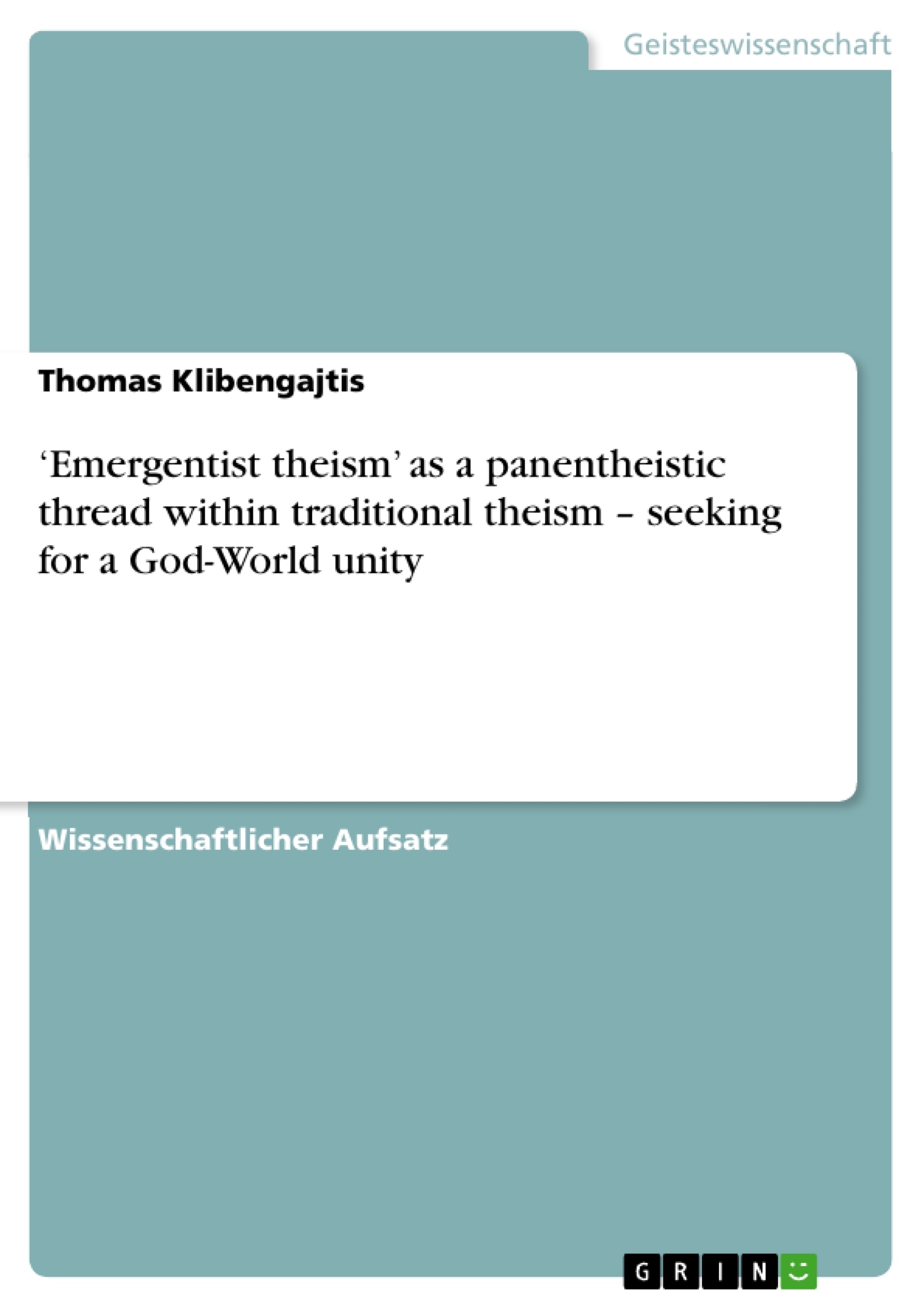Transdisciplinarity is possible only by developing a common meta-level for all disciplines involved. A meta-level containing “the knowledge of things divine and human” has been known for centuries as wisdom. Wisdom, however, in the latter meaning assumes a higher dimension in which our human world only participates. The aim of this paper is to depict a panentheistic conception of God and world which I would like to name ‘the emergentist theism’. The second part of the paper gives reasons for the emphasis of God’s transcendence within the Western theism, such as: (1) the transcendent view of God/gods present within the Old Testament and the Greek religious tradition; (2) the philosophical context of Platonism of the rising Jewish and Christian theism. The third part shows how Aristotle’s physics, especially his conception of the First Unmoved Mover, exerted influence on the theological conception of God’s transcendence being present both in Protestant and Catholic Tradition. Because of the Thomistic influence exerted first on the theology of the Counter Reformation, than on Modern Scholastic and finally on Neo-Scholasticism, this Aristotelian view remained, predominant within the Catholic Tradition up to the Second Vatican Council. The fourths part of the paper depicts how the rise of modern panentheism was influenced by Neo-Scholasticism, Darwinism and German idealism and why, therefore, some panentheists identified the traditional theism with the Neo-Scholastic, i.e. ‘the Aristotelian’ conception of God. The fifths part gives an introduction into the philosophical and theological monism. By the first I mean the conception of deriving of the many from one principle, by the letter the view of the emergence of creatures from God through Logos. In this conception, which I call ‘the emergentist theism’, God is not ‘outside’ but within the creation which expresses and reveals Himself even to Himself. The sixth and last part of the paper shows, in a very short sketch, that some traces of this conception of God’s immanence can be found in the writings of: Justin the Martyr, Clemens Alexandrinus, Origen, Gregory of Nyssa, Gregory of Nazianz, Basil of Cesarea, Pseudo-Denys, Maximus Confessor and Gregory Palamas.
Inhaltsverzeichnis
- Transdisciplinarity as wisdom?
- Origins of the Western conceptions of transcendence
- Transcendence growing physically: Aristotle's merit and fault
Zielsetzung und Themenschwerpunkte
Der Artikel untersucht das Konzept des "emergentist theism" als eine panentheistische Strömung innerhalb der traditionellen Theologie, die nach einer Einheit von Gott und Welt strebt. Ziel ist es, eine panentheistische Vorstellung von Gott und Welt zu beschreiben, die als "emergentist theism" bezeichnet wird.
- Die Bedeutung von Transzendenz innerhalb der westlichen Theologie
- Der Einfluss der aristotelischen Physik auf die theologische Vorstellung von Gottes Transzendenz
- Der Aufstieg des modernen Panentheismus unter dem Einfluss der Neuscholastik, des Darwinismus und des deutschen Idealismus
- Philosophischer und theologischer Monismus als Grundlage des "emergentist theism"
- Die Präsenz von Gottes Immanenz in den Schriften verschiedener Kirchenväter
Zusammenfassung der Kapitel
Transdisciplinarity as wisdom?
Das Kapitel diskutiert die Notwendigkeit einer gemeinsamen Metaebene für verschiedene wissenschaftliche Disziplinen, um eine wirkliche Transdisziplinarität zu erreichen. Es wird argumentiert, dass Weisheit als diese Metaebene dienen kann, die das Wissen über "göttliche und menschliche Dinge" umfasst.
Origins of the Western conceptions of transcendence
Das Kapitel erörtert die Entwicklung des Konzepts der Gottestranszendenz in der westlichen Zivilisation. Es wird untersucht, wie die frühen jüdischen, christlichen und islamischen Traditionen sowohl eine transzendente als auch eine immanente Sichtweise Gottes enthielten, wobei die transzendente Sichtweise im Laufe der Zeit zunehmend betont wurde.
Transcendence growing physically: Aristotle's merit and fault
Das Kapitel analysiert den Einfluss von Aristoteles auf die Betonung der Gottestranszendenz in der westlichen Theologie. Es wird hervorgehoben, wie Aristoteles' Konzept des Ersten Bewegers die platonische transzendente Sichtweise fortsetzte und eine neue physische und kosmologische Dimension hinzufügte.
Schlüsselwörter
Die wichtigsten Schlüsselwörter und Schwerpunktthemen des Artikels sind: Emergentist Theism, Panentheismus, Transzendenz, Immanenz, Weisheit, Transdisziplinarität, Aristoteles, Platon, Neuscholastik, Gottesbeweise, Schöpfung, Monismus.
Häufig gestellte Fragen
Was bedeutet der Begriff "emergentist theism"?
Es beschreibt eine panentheistische Sichtweise, bei der Gott nicht außerhalb der Schöpfung steht, sondern sich innerhalb der Welt offenbart und durch sie wirkt.
Wie beeinflusste Aristoteles die westliche Gottesvorstellung?
Aristoteles' Konzept des "unbewegten Bewegers" prägte die starke Betonung der Transzendenz Gottes in der protestantischen und katholischen Tradition bis zum Zweiten Vatikanischen Konzil.
Was ist der Unterschied zwischen Transzendenz und Immanenz?
Transzendenz meint das Überweltliche, Gott außerhalb der Welt. Immanenz beschreibt die Anwesenheit Gottes innerhalb der Schöpfung.
Welche Rolle spielt der Panentheismus in der modernen Theologie?
Beeinflusst durch Darwinismus und deutschen Idealismus, sucht der Panentheismus nach einer Einheit von Gott und Welt, ohne beide vollständig gleichzusetzen.
Finden sich Spuren dieser Immanenz bei den Kirchenvätern?
Ja, die Arbeit zeigt Ansätze dieser Sichtweise in den Schriften von Denkern wie Origenes, Gregor von Nyssa oder Maximus Confessor auf.
- Quote paper
- Dr. phil. Mag. theol. Thomas Klibengajtis (Author), 2012, ‘Emergentist theism’ as a panentheistic thread within traditional theism – seeking for a God-World unity, Munich, GRIN Verlag, https://www.grin.com/document/191439



